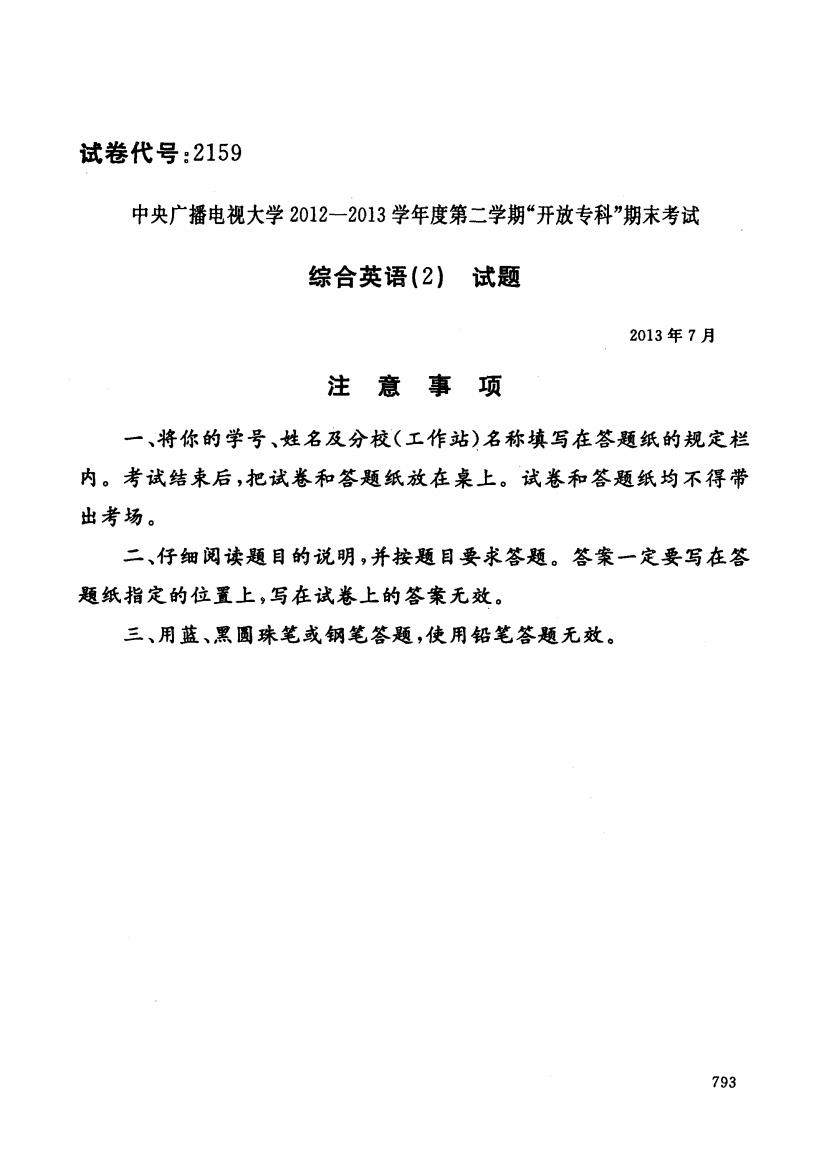
试卷代号:2159 中央广播电视大学2012一2013学年度第二学期“开放专科”期末考试 综合英语(2)试题 2013年7月 注意 事项 一、将你的学号、姓名及分校(工作站)名称填写在答题纸的规定栏 内。考试结束后,把试卷和答题纸放在桌上。试卷和答题纸均不得带 出考场。 二、仔细阅读题目的说明,并按题目要求答题。答案一定要写在答 题纸指定的位置上,写在试卷上的答案无效。 三、用蓝、黑圆珠笔或钢笔答题,使用铅笔答题无效。 793
试卷代号 5 9 中央广播电视大学 3学年度第二学期"开放专科"期末考试 综合英语 )试题 2013 年7 注意事项 一、将你的学号、姓名及分校(工作站)名称填写在答题纸的规定栏 内。考试结束后,把试卷和答题纸放在桌上。试卷和答题纸均不得带 出考场。 二、仔细阅读题目的说明,并按题目要求答题。答案一定要写在答 题纸指定的位置上,写在试卷上的答案无效。 三、用蓝、黑圆珠笔或钢笔答题,使用铅笔答题无效。 793
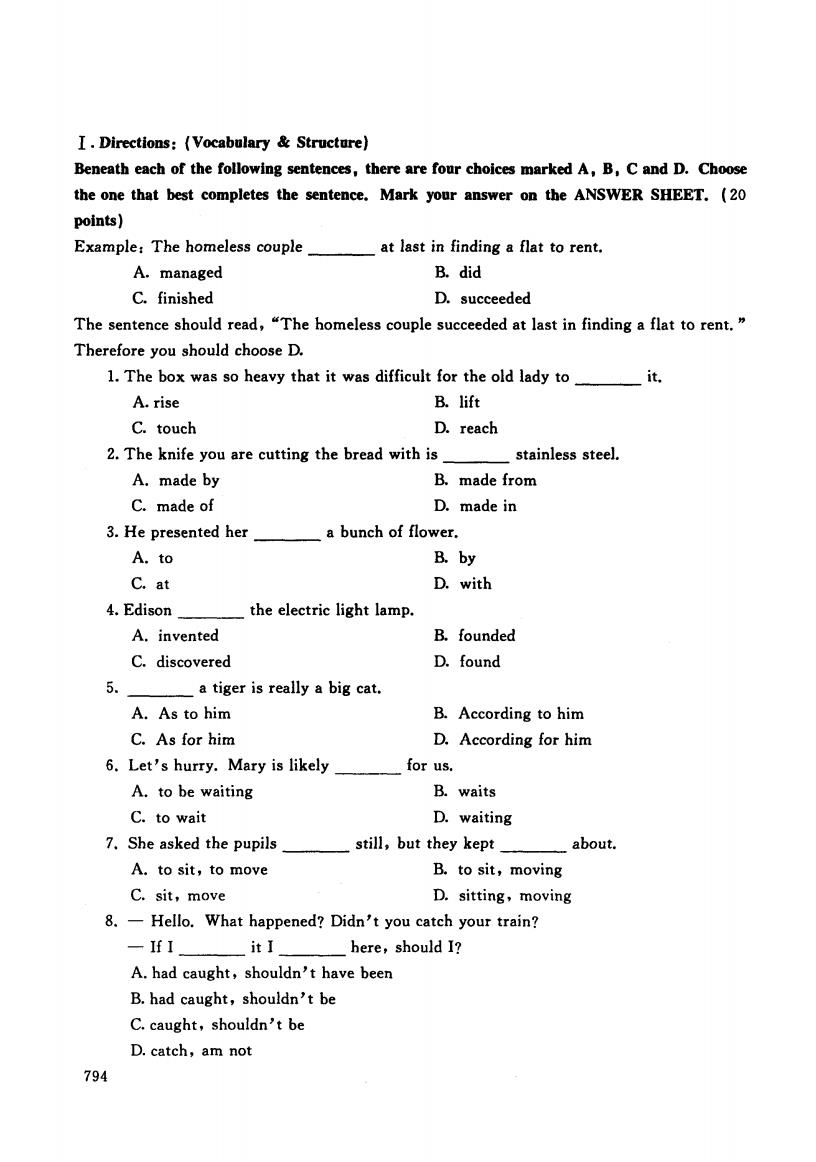
I.Directions:(Vocabulary Structure) Beneath each of the following sentences,there are four choices marked A,B,C and D.Choose the one that best completes the sentence.Mark your answer on the ANSWER SHEET.(20 points) Example:The homeless couple at last in finding a flat to rent. A.managed B.did C.finished D.succeeded The sentence should read,"The homeless couple succeeded at last in finding a flat to rent." Therefore you should choose D. 1.The box was so heavy that it was difficult for the old lady to it. A.rise B.lift C.touch D.reach 2.The knife you are cutting the bread with is stainless steel. A.made by B.made from C.made of D.made in 3.He presented her a bunch of flower. A.to B.by C.at D.with 4.Edison the electric light lamp. A.invented B.founded C.discovered D.found 、 5 a tiger is really a big cat. A.As to him B.According to him C.As for him D.According for him 6.Let's hurry.Mary is likely for us. A.to be waiting B.waits C.to wait D.waiting 7.She asked the pupils still,but they kept about. A.to sit,to move B.to sit,moving C.sit,move D.sitting,moving 8.-Hello.What happened?Didn't you catch your train? 一fI it I here,should I? A.had caught,shouldn't have been B.had caught,shouldn't be C.caught,shouldn't be D.catch,am not 794
I . Directions: ( 侃abulary " Structure) Benea or the following sentences , there are four choic四marked A, B, C and D. Ch the one that best complet臼the sentence. Mark your answer on the ANSWER SHEET. (20 points) Example: The homeless couple 一一 at last in finding a flat to rent. A. managed B. did C. finished D. succeeded The sentence should read , "The homeless couple succeeded at last in finding a flat to rent. " Therefore you should choose D. 1. The box was so heavy that it was difficult for the old lady to it. A. rise B. lift C. touch D. reach 2. The knife you are cutting the bread with is 一一 一一 stainless steel. A. made by B. made from C. made of D. made in 3. He presented her 一-一一 a bunch of flower. A. to B. by C. at D. with 4. Edison the electric light lamp. about. B. founded D. found B. to sit , moving D. sitting , moving B. According to him D. According for him for us. B. waits D. waiting still, but they kept A. invented C. discovered --一-一_ a tiger is really a big cat. A. As to him C. As for him 6. Let's hurry. Mary is likely A. to be waiting C. to wait 7. She asked the pupils A. to sit , to move C. sit , move 5. 8. - Hello. What happened? Didn't you catch your train? 一If I it I here , should I? A. had caught , shouldn't have been B. had caught , shouldn't be C. caught , shouldn' t be D. catch , am not 794
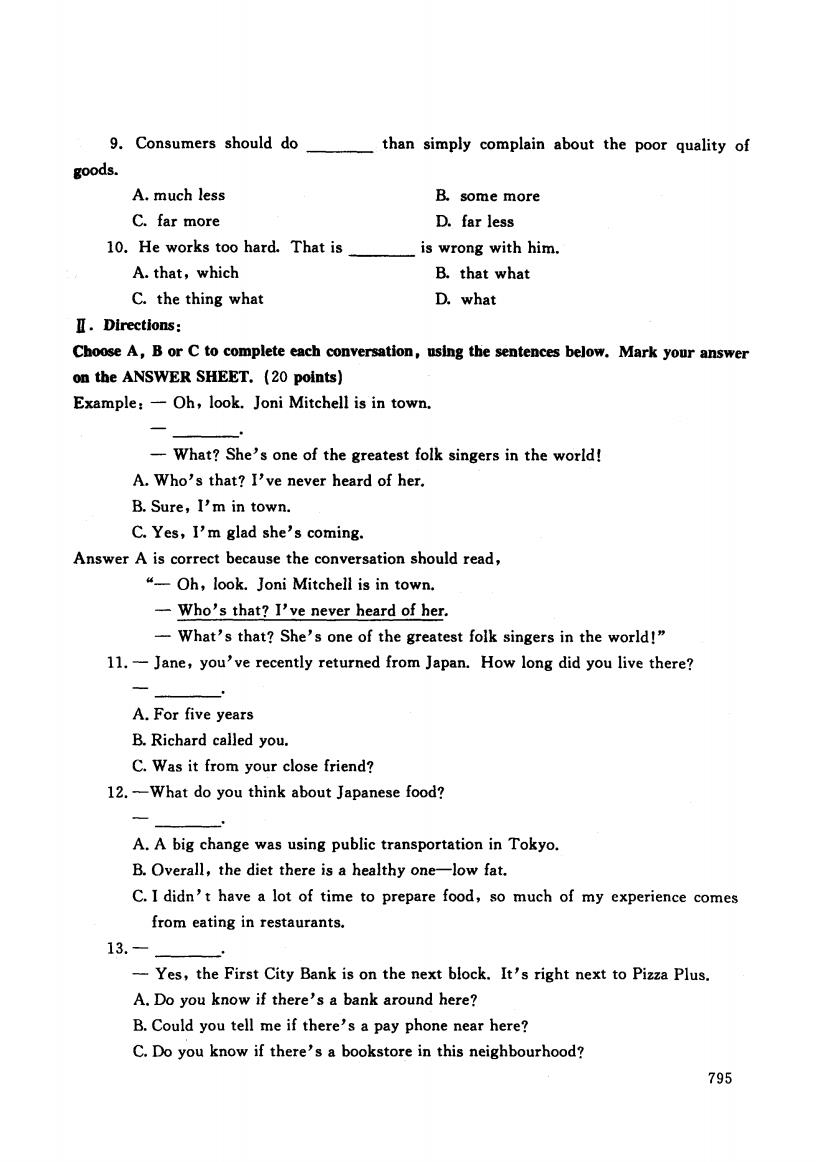
9.Consumers should do than simply complain about the poor quality of goods. A.much less B.some more C.far more D.far less 10.He works too hard.That is is wrong with him. A.that,which B.that what C.the thing what D.what I.Directions: Choose A,B or C to complete each conversation,using the sentences below.Mark your answer on the ANSWER SHEET.(20 points) Example:-Oh,look.Joni Mitchell is in town. -What?She's one of the greatest folk singers in the world! A.Who's that?I've never heard of her. B.Sure,I'm in town. C.Yes,I'm glad she's coming. Answer A is correct because the conversation should read, "-Oh,look.Joni Mitchell is in town. -Who's that?I've never heard of her. -What's that?She's one of the greatest folk singers in the world!" 11.-Jane,you've recently returned from Japan.How long did you live there? A.For five years B.Richard called you. C.Was it from your close friend? 12.-What do you think about Japanese food? A.A big change was using public transportation in Tokyo. B.Overall,the diet there is a healthy one-low fat. C.I didn't have a lot of time to prepare food,so much of my experience comes from eating in restaurants. 13.- -Yes,the First City Bank is on the next block.It's right next to Pizza Plus. A.Do you know if there's a bank around here? B.Could you tell me if there's a pay phone near here? C.Do you know if there's a bookstore in this neighbourhood? 795
9. Consumers should do loods. A. much less C. far more 10. He works too hard. That is A. that , which C. the thing what than simply complain about the poor quality of so more D. far less is wrong with him. B. that what D. what n. Directions: Cb 揭eA. B or C to complete 臼chωnversation. using the senten below. Mark your answer on the ANSWER SHEET. (20 points) Example: 一Oh look. Joni Mitchell is in town. - What? She's one of the greatest folk singers in the world! A. Who's that? I've never heard of her. B. Sure , I'm in town. C. Yes, I'm glad she's coming. Answer A is correct because the conversation should read , "一 look. Joni Mitchell is in town. -Who's that? I've never heard of her. - What's that? She's one of the greatest folk singers in the world!" 11.•Jane , you've recently returned from Japan. How long did you live there? A. For five years called you. C. Was it from your close friend? 12. -What do you think about Japanese food? A. A big change was using public transportation in Tokyo. B. Overall , the diet there is a healthy one一low fat. C. I didn' t have a lot of time to prepare food , so much of my experience comes from eating in restaurants. 13. - Yes, the First City Bank is on the next block. It' s right next to Pizza Plus. A. Do you know if there's a bank around here? B. Could you tell me if there's a pay phone near here? C. Do you know if there's a bookstore in this neighbourhood? 795
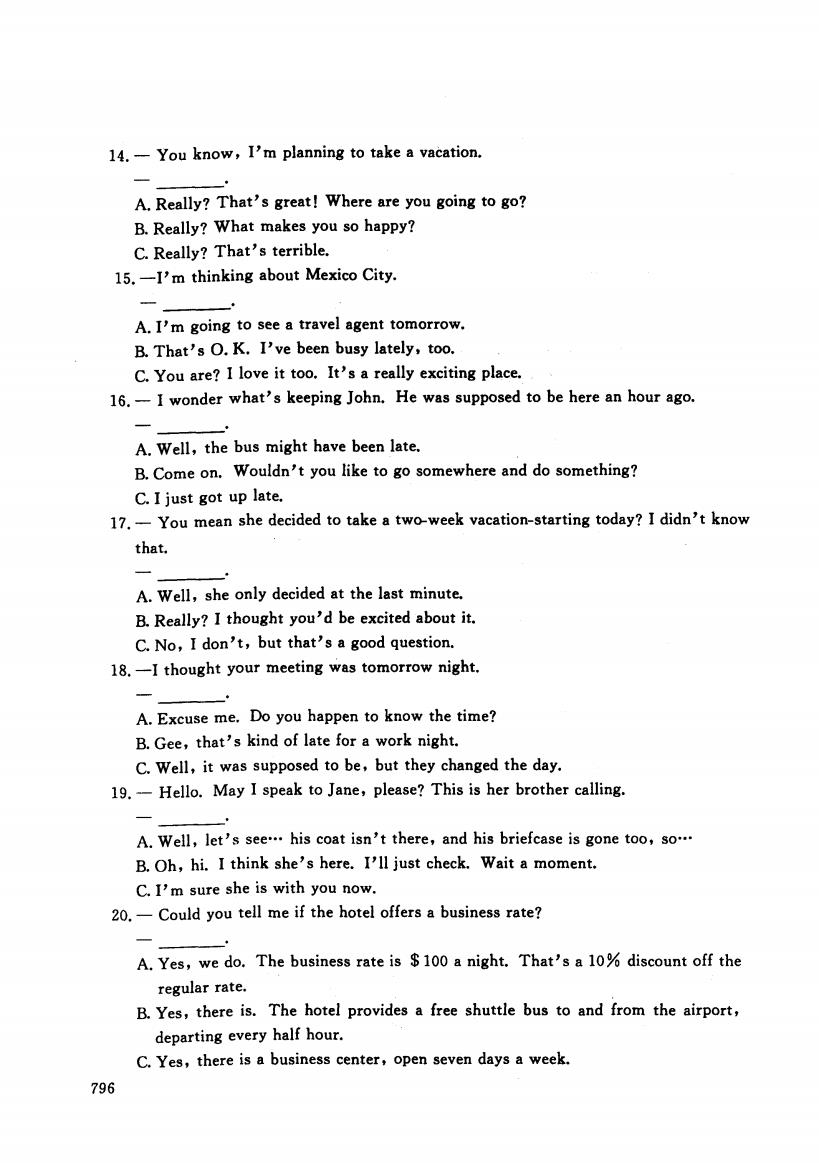
14.-You know,I'm planning to take a vacation. A.Really?That's great!Where are you going to go? B.Really?What makes you so happy? C.Really?That's terrible. 15.-I'm thinking about Mexico City. A.I'm going to see a travel agent tomorrow. B.That's O.K.I've been busy lately,too. C.You are?I love it too.It's a really exciting place. 16.-I wonder what's keeping John.He was supposed to be here an hour ago. A.Well,the bus might have been late. B.Come on.Wouldn't you like to go somewhere and do something? C.I just got up late. 17.-You mean she decided to take a two-week vacation-starting today?I didn't know that. A.Well,she only decided at the last minute. B.Really?I thought you'd be excited about it. C.No,I don't,but that's a good question. 18.-I thought your meeting was tomorrow night. A.Excuse me.Do you happen to know the time? B.Gee,that's kind of late for a work night. C.Well,it was supposed to be,but they changed the day. 19.-Hello.May I speak to Jane,please?This is her brother calling. A.Well,let's see.his coat isn't there,and his briefcase is gone too,so... B.Oh,hi.I think she's here.I'll just check.Wait a moment. C.I'm sure she is with you now. 20.-Could you tell me if the hotel offers a business rate? A.Yes,we do.The business rate is $100 a night.That's a 10%discount off the regular rate. B.Yes,there is.The hotel provides a free shuttle bus to and from the airport, departing every half hour. C.Yes,there is a business center,open seven days a week. 796
14. - You know. l'm planning to take a vacation. A. Really? That's great! Where are you going to go? B. Really? What makes you so happy? C.Really? That's terrible. 15. -I'm thinking about Mexico City. A. I'm going to see a travel agent tomorrow. B. That's D. K. I've been busy lately. too. C. You are? I love it too. It' s a really exciting place. 16. - I wonder what's keeping John. He was supposed to be here an hour ago. A. Well. the bus might have been late. B. Come on. Wouldn't you like to go somewhere and do something? C.I just got up late. 17. - You mean she decided to take a two-week vacation-starting today? I didn' t know that. A. Well. she only decided at the last minute. B. Really? I thought you'd be excited about it. C. No. I don't. but that's a good question. 18.-I thought your meeting was tomorrow night. A. Excuse me. Do you happen to know the time? B. Gee. that's kind of late for a work night. C. Well. it was supposed to be. but they changed the day. 19. - Hello. May I speak to Jane. please? This is her brother calling. A. Well. let's see'" his coat isn't there. and his briefcase is gone too. SO'" B. Dh , hi. I think she's here. I'll just check. Wait a moment. C. I'm sure she is with you now. 20. - Could you tell me if the hotel offers a business rate? A. Yes. we do. The business rate is $100 a night. That's a 10% discount off the regular rate. B. Yes, there is. The hotel provides a free shuttle bus to and from the airport. departing every half hour. C. Yes, there is a business center. open seven days a week. 796
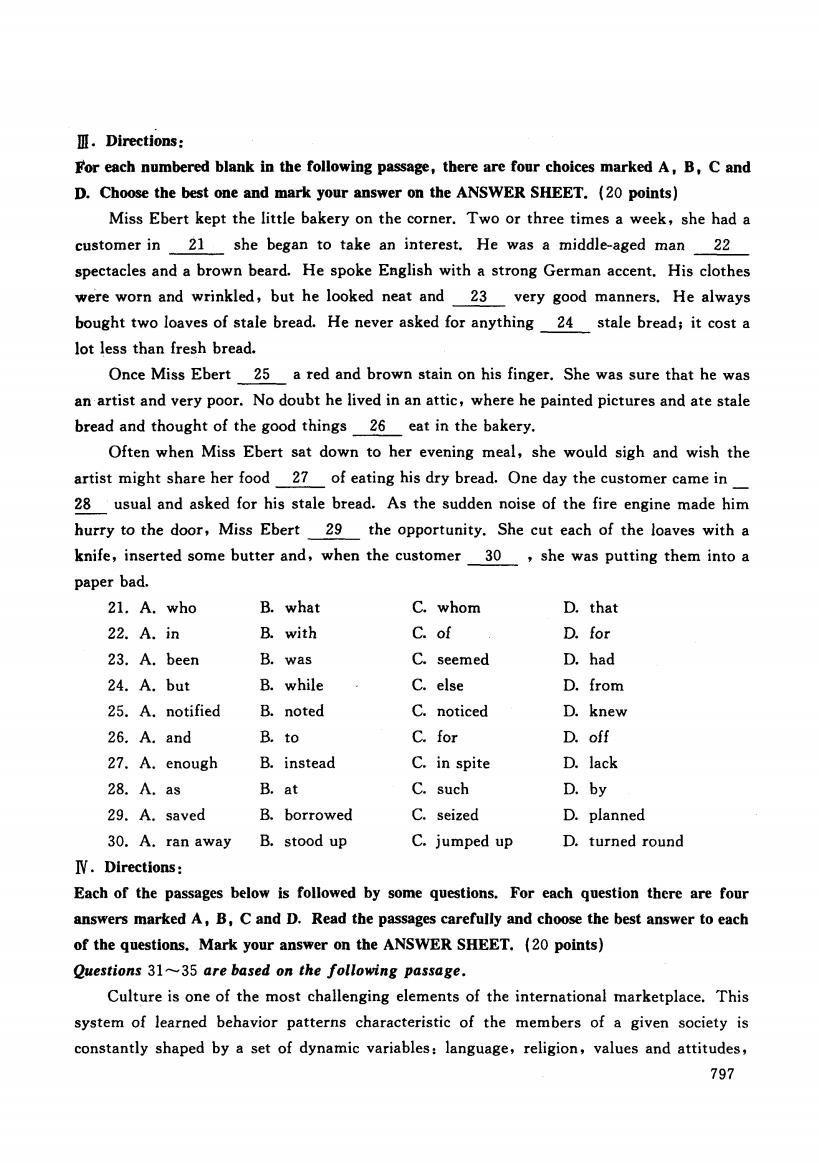
亚.Directions:: For each numbered blank in the following passage,there are four choices marked A,B,C and D.Choose the best one and mark your answer on the ANSWER SHEET.(20 points) Miss Ebert kept the little bakery on the corner.Two or three times a week,she had a customer in 21 she began to take an interest.He was a middle-aged man 22 spectacles and a brown beard.He spoke English with a strong German accent.His clothes were worn and wrinkled,but he looked neat and 23 very good manners.He always bought two loaves of stale bread.He never asked for anything 24 stale bread;it cost a lot less than fresh bread. Once Miss Ebert 25 a red and brown stain on his finger.She was sure that he was an artist and very poor.No doubt he lived in an attic,where he painted pictures and ate stale bread and thought of the good things 26 eat in the bakery. Often when Miss Ebert sat down to her evening meal,she would sigh and wish the artist might share her food 27 of eating his dry bread.One day the customer came in 28 usual and asked for his stale bread.As the sudden noise of the fire engine made him hurry to the door,Miss Ebert 29 the opportunity.She cut each of the loaves with a knife,inserted some butter and,when the customer 30,she was putting them into a paper bad. 21.A.who B.what C.whom D.that 22.A.in B.with C.of D.for 23.A.been B.was C.seemed D.had 24.A.but B.while C.else D.from 25.A.notified B.noted C.noticed D.knew 26.A.and B.to C.for D.off 27.A.enough B.instead C.in spite D.lack 28.A.as B.at C.such D.by 29.A.saved B.borrowed C.seized D.planned 30.A.ran away B.stood up C.jumped up D.turned round N.Directions: Each of the passages below is followed by some questions.For each question there are four answers marked A,B,C and D.Read the passages carefully and choose the best answer to each of the questions.Mark your answer on the ANSWER SHEET.(20 points) Questions 31~35 are based on the following passage. Culture is one of the most challenging elements of the international marketplace.This system of learned behavior patterns characteristic of the members of a given society is constantly shaped by a set of dynamic variables:language,religion,values and attitudes, 797
m. Directions : For each numbered blank in the following passage , there are four choices marked A, B, C and D. Choωe the 四t one and mark your answer on the ANSWER SHEET. (20 points) Miss Ebert kept the little bakery on the corner. Two or three times a week , she had a customer in 21 she began to take an interest. He was a middle-aged man spectacles and a brown beard. He spoke English with a strong German accent. His clothes were worn and wrinkled , but he looked neat and 一very good manners. He always bought two loaves of stale bread. He never asked for anything 24 stale bread; it cost a lot less than fresh bread. Once Miss Ebert 25 a red and brown stain on his finger. She was sure that he was anartist and very poor. No doubt he lived in an attic , where he painted pictures and ate stale bread and thought of the good things 26 eat in the bakery. Often when Miss Ebert sat down to her evening meal, she would sigh and wish the artist might share her food ~王一 eating his dry bread. One day the customer came in _ 28 usual and asked for his stale bread. As the sudden noise of the fire engine made him hurry to the door, Miss Ebert 29 the opportunity. She cut each of the loaves with a knife , inserted some butter and. when the customer 30 , she was putting them into a paper bad. 21. A. who 22. A. in 23. A. been 24. A. but 25. A. notified 26. A. and 27. A. enough 28. A. as 29. A. saved 30. A. ran away B. stood up N. Directions: Each of the passages below is followed by some questions. For each question there are four answers marked A, B , C and D. Read the passages carefully and choose the best answer to each of the questions. Mark your answer on the ANSWER SHEET. (20 points) Questions 31-35 are based on the following passage. Culture is one of the most challenging elements of the international marketplace. This system of learned behavior patterns characteristic of the members of a given society is constantly shaped by a set of dynamic variables: language. religion , values and attitudes. B. what B. B. B. B. B. to B. C. whom D. that D. for D. had D. D. D. off D. D. by D. D. with C. of was C. seemed while C. else from noted C. noticed knew C. for instead B. at C. in spite C. such lack B. borrowed C. seized Ju roun d arnnneeJu PUlJ C. jumped up 797
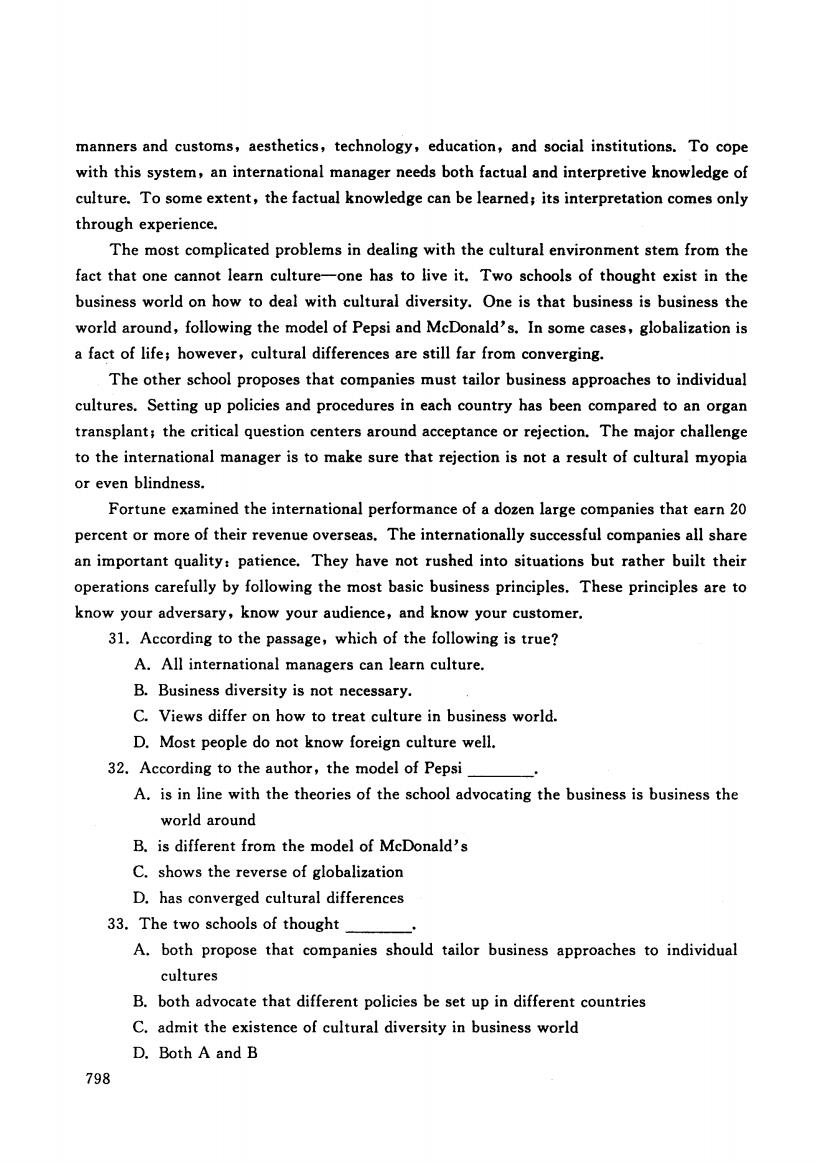
manners and customs,aesthetics,technology,education,and social institutions.To cope with this system,an international manager needs both factual and interpretive knowledge of culture.To some extent,the factual knowledge can be learned;its interpretation comes only through experience. The most complicated problems in dealing with the cultural environment stem from the fact that one cannot learn culture-one has to live it.Two schools of thought exist in the business world on how to deal with cultural diversity.One is that business is business the world around,following the model of Pepsi and McDonald's.In some cases,globalization is a fact of life;however,cultural differences are still far from converging. The other school proposes that companies must tailor business approaches to individual cultures.Setting up policies and procedures in each country has been compared to an organ transplant;the critical question centers around acceptance or rejection.The major challenge to the international manager is to make sure that rejection is not a result of cultural myopia or even blindness. Fortune examined the international performance of a dozen large companies that earn 20 percent or more of their revenue overseas.The internationally successful companies all share an important quality:patience.They have not rushed into situations but rather built their operations carefully by following the most basic business principles.These principles are to know your adversary,know your audience,and know your customer. 31.According to the passage,which of the following is true? A.All international managers can learn culture. B.Business diversity is not necessary. C.Views differ on how to treat culture in business world. D.Most people do not know foreign culture well. 32.According to the author,the model of Pepsi A.is in line with the theories of the school advocating the business is business the world around B.is different from the model of McDonald's C.shows the reverse of globalization D.has converged cultural differences 33.The two schools of thought A.both propose that companies should tailor business approaches to individual cultures B.both advocate that different policies be set up in different countries C.admit the existence of cultural diversity in business world D.Both A and B 798
manners and customs, aesthetics, technology , education, and social institutions. To cope with this system, an international manager needs both factual and interpretive knowledge of culture. To some extent , the factual knowledge can be learned; its interpretation comes only through experience. The most complicated problems in dealing with the cultural environment stem from the fact that one cannot learn culture-one has to live it. Two schools of thought exist in the business world on how to deal with cultural diversity. One is that business is business the world around , following the model of Pepsi and McDonald In some cases, globalization is a fact of life; however, cultural differences are still far from converging. The other school proposes that companies must tailor business approaches to individual cultures. Setting up policies and procedures in each country has been compared to an organ transplant; the critical question centers around acceptance or rejection. The major challenge to the international manager is to make sure that rejection is not a result of cultural myopia or even blindness. Fortune examined the international performance of a dozen large companies that earn 20 percent or more of their revenue overseas. The internationally successful companies all share an important quality: patience. They have not rushed into situations but rather built their operations carefully by following the most basic business principles. These principles are to know your adversary , know your audience , and know your customer. 31. According to the passage , which of the following is true? A. All international managers can learn culture. B. Business diversity is not necessary. C. Views differ on how to treat culture in business world. D. Most people do not know foreign culture well. 32. According to the author, the model of Pepsi A. is in line with the theories of the school advocating the business is business the world around B. is different from the model of McDonald's c. shows the reverse of globalization D. has converged cultural differences 33. The two schools of thought A. both propose that companies should tailor business approaches to individual cultures B. both advocate that different policies be set up in different countries C. admit the existence of cultural diversity in business world D. Both A and B 798

34.This article is supposed to be most useful for those A.who are interested in researching the topic of cultural diversity B.who have connections to more than one type of culture C.who want to travel abroad D.who want to run business on International Scale 35.According to Fortune,successful international companies A.earn 20 percent or more of their revenue overseas B.all have the quality of patience C.will follow the overseas local cultures D.adopt the policy of internationalization Questions 36~40 are based on the following passage. Telephone,television,.radio,and telegragh all help people communicate with each other.Because of these devices,ideas and news of events spread quickly all over the world. For example,within second,people can know the results of an election in another country. An international football match comes into the homes of everyone with a television set. News of a disaster such as an earthquake or a flood can bring help from distant countries. Within hours,help is on the way.Because of modern technology like the satellites that travel around the world,information travels fast. How has this speed of communication changed the world?To many people,the world has become smaller.Of course this does not mean that the world is actually physically smaller.It means that the world seems smaller.Two hundred years ago,communication between the continents took a long time.All news was carried on ships that took weeks or even months to cross the oceans.In the seventeenth and eighteenth centuries,it took six weeks for news from Europe to reach Americas.This time difference influenced people's action.For example,one battle,or fight,in the War of 1812 between England and the United States could have been avoided.A peace agreement had already been signed.Peace was made in England,but the news of peace took six weeks to reach America.During the six weeks,the large and serious Battle of New Orleans was fought.Many people lost their lives after a peace treaty had been signed.They would not have died if news had come in time.In the past,communication took much more time than it does now.There was a good reason why the world seemed so much larger than it does today. 36.News spreads fast because of A.modern transportation B.new technology C.the changes of the world D.a peace agreement 799
34. This article is supposed to be most useful for those A. who are interested in researching the topic of cultural diversity have connections to more than one type of culture C. who want to travel abroad D. who want to run business on International Scale 35. According to Fortune , successful international companies A. earn 20 percent or more of their revenue overseas B. all have the quality of patience C. will follow the overseas local cultures D. adopt the policy of internationalization Questions 36-40 are based on the following passage. Telephone , television , radio , and telegragh all help people communicate with each other. Because of these devices, ideas and news of events spread quickly all over the world. For example , within second , people can know the results of an election in another country. An international football match comes into the homes of everyone with a television set. News of a disaster such as an earthquake or a flood can bring help from distant countries. Within hours, help is on the way. Because of modern technology like the satellites that travel around the world , information travels fast. How has this speed of communication changed the world? To many people , the world has become smaller. Of course this does not mean that the world is actually physically smaller. It means that the world seems smaller. Two hundred years ago , communication between the continents took a long time. All news was carried on ships that took weeks or even months to cross the oceans. In the seventeenth and eighteenth centuries, it took six weeks for news from Europe to reach Americas. This time difference influenced people' s action. For example , one battle , or fight , in the War of 1812 between England and the United States could have been avoided. A peace agreement had already been signed. Peace was made in England , but the news of peace took six weeks to reach America. During the six weeks, the large and serious Battle of New Orleans was fought. Many people lost their lives after a peace treaty had been signed. They would not have died if news had come in time. In the past , communication took much more time than it does now. There was a good reason why the world seemed so much larger than it does today. 36. News spreads fast because of A. modern transportation C. the changes of the world B. new technology D. a peace agreement 799
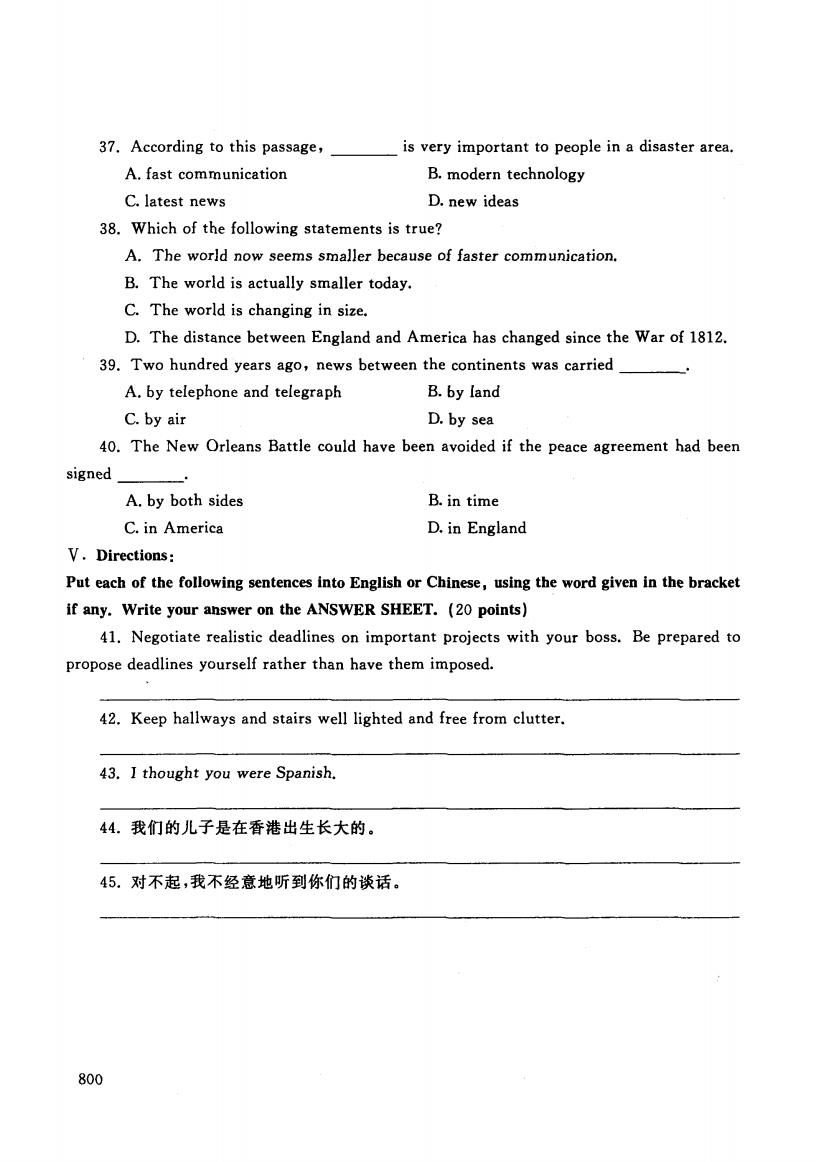
37.According to this passage, is very important to people in a disaster area. A.fast communication B.modern technology C.latest news D.new ideas 38.Which of the following statements is true? A.The world now seems smaller because of faster communication. B.The world is actually smaller today. C.The world is changing in size. D.The distance between England and America has changed since the War of 1812. 39.Two hundred years ago,news between the continents was carried A.by telephone and telegraph B.by land C.by air D.by sea 40.The New Orleans Battle could have been avoided if the peace agreement had been signed A.by both sides B.in time C.in America D.in England V.Directions: Put each of the following sentences into English or Chinese,using the word given in the bracket if any.Write your answer on the ANSWER SHEET.(20 points) 41.Negotiate realistic deadlines on important projects with your boss.Be prepared to propose deadlines yourself rather than have them imposed. 42.Keep hallways and stairs well lighted and free from clutter. 43.I thought you were Spanish. 44.我们的儿子是在香港出生长大的。 45.对不起,我不经意地听到你们的谈话。 800
37. According to this passage , A. fast communication c. latest news is very important to people in a disaster area. B. modern technology D. new ideas 38. Which of the following statements is true? A. The world now seems smaller because of faster communication. B. The world is actually smaller today. C. The world is changing in size. D. The distance between England and America has changed since the War of 1812. 39. Two hundred years ago , news between the continents was carried A. by telephone and telegraph B. by land C. by air D. by sea 40. The New Orleans Battle could have been avoided if the peace agreement had been signed A. by both sides C. in America B. in time D. in England V. Directions : Put each of the following sentenc四into English or Chinese , using the word given in the bracket if any. Write your answer on the ANSWER SHEET. (20 points) 41. Negotiate realistic deadlines on important projects with your boss. Be prepared to propose deadlines yourself rather than have them imposed. 42. Keep hallways and stairs well lighted and free from clutter. 43. I thought you were Spanish. 44. 我们 子是 生长大 45. 我不经 谈话 800
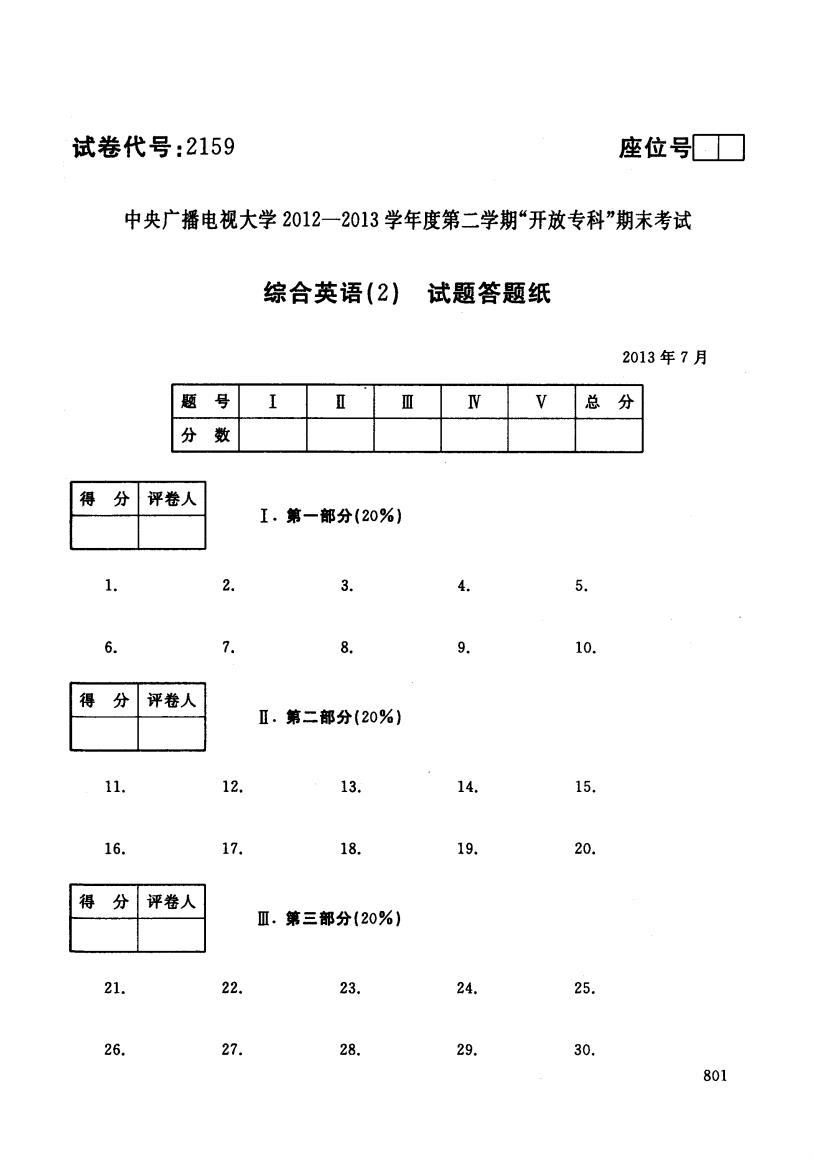
试卷代号:2159 座位☐ 中央广播电视大学2012一2013学年度第二学期“开放专科”期末考试 综合英语(2) 试题答题纸 2013年7月 题 号 I I Ⅲ W v 总 分 分 数 得分 评卷人 I.第一部分(20%) 2. 3 4. 5. 6. 7. 8. 9. 10. 得分 评卷人 Ⅱ.第二部分(20%) 11. 12. 13. 14. 15. 16. 17. 18. 19. 20. 得 分 评卷人 Ⅲ.第三部分(20%) 21. 22. 23. 24. 25. 26. 27. 28. 29. 30 801
试卷代号 座位号 中央广播电视大学 3学年度第二学期"开放专科"期末考试 综合英语 试题答题纸 2013 年7 |:;| I E N V |且分| I~ *I W*AI I. 第-部分 1. 2. 3. 4. 5. 6. 7. 8. 9. 10. I~ *I W*AI II. 部分 11. 12. 13. 14. 15. 16. 17. 18. 19. 20. I~ *I W*AI m. 第三部分 21. 22. 23. 24. 25. 26. 27. 28. 29. 30. 801
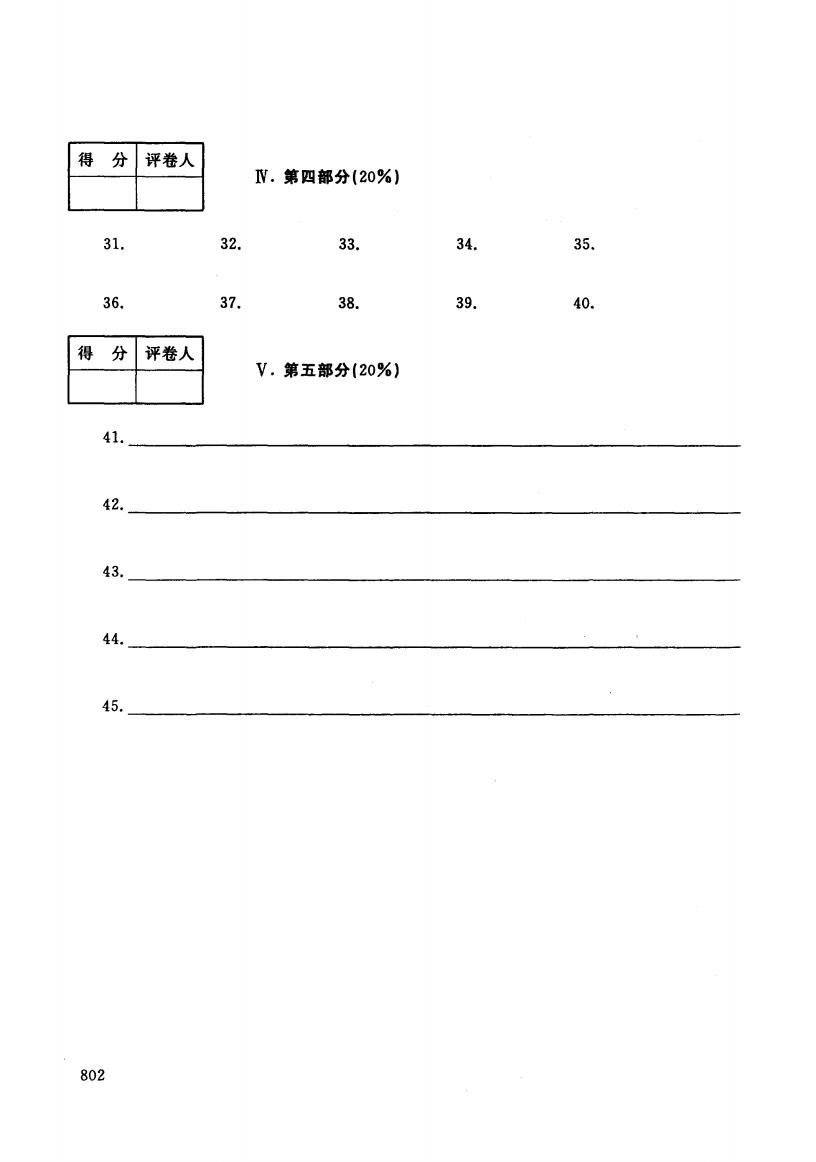
得分 评卷人 N.第四部分(20%) 31. 32. 33. 34. 35. 36. 37. 38. 39. 40. 得分 评卷人 V.第五部分(20%) 41. 42. 43. 44. 45. 802
得分|评卷人 N. 31. 32. 33. 34. 35. 36. 37. 38. 39. 40. V. 五部 20 41. 42. 43. 44. 45. 802